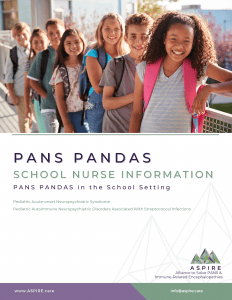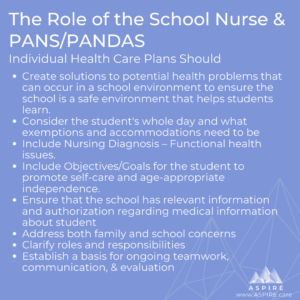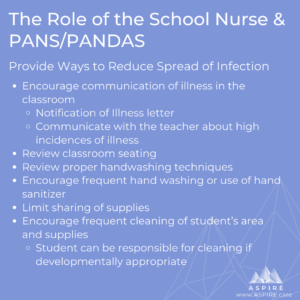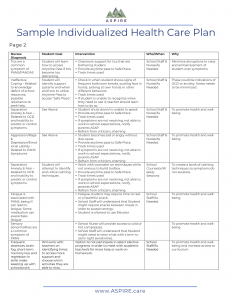PANS/PANDAS School Nurse Information
 Register with ASPIRE to download the twelve-page PANS PANDAS School Nurse Overview information toolkit and share this page.
Register with ASPIRE to download the twelve-page PANS PANDAS School Nurse Overview information toolkit and share this page.
ASPIRE School Nurse Information Toolkit
School Nurses play an integral role in the health of students. They support students and student health every day of the year. Children with PANS/PANDAS have complex physical and mental health conditions that benefit from the support of a School Nurse. They connect providers, parents, & school, staff working to bolster student attendance and wellness. A School Nurse can coordinate care between the child’s health care providers, other staff, and parents, so their health needs are met at school and are ready to learn. Taking the time to communicate and collaborate as a team is a key part of ensuring a PANS/PANDAS student’s success.
“The school nurse, as a member of a multidisciplinary team, benefits from an awareness of these disorders, the resulting impact on school performance, and the recommended treatment.” – Kathy Bagian, MSN, RN, CSN, Sheila Q. Hartung, Ph.D., RN, Is It PANS, CANS, or PANDAS? Neuropsychiatric Pediatric Disorders That Are Not Black and White—Implications for the School Nurse
ASPIRE School Nurse Information Packet
Also, download and share ASPIRE 1-Page School Nurse Overview
Unique Position of the School Nurse
The school nurse, equipped with medical information, is in a valuable position to assist in the identification of possible PANDAS cases. She may be the significant professional in a school setting who is first able to link a recent or recurring strep infection with sudden atypical behavior. The perceptive school nurse will also be able to identify and consider any variety of confounding medical symptoms. – Kathy O’Rourke, MA, PANDAS in the School Setting
- May be the first person to establish a link between a recent or recurring strep infection with a sudden onset of atypical behavior
- Can help report any abrupt changes in behavior, eating habits, or school performance to the family
- Can inform parents of any communicable illness in the classroom
- Can help develop and monitor attendance places and IHP/IHC
- May be the person who knows the student better over time
School Nurse Role
- Bridge communication between staff, parents and outside providers
- Develop and monitor Individual Healthcare Plans (IHP/IHCP)
- Provide guidance to the team developing 504 and IEP plans
- Infection Control – Communicate with family and school community about strep and other infectious illness (strep, mycoplasma pneumonia, Coxsackie, impetigo, etc.)
- Provide ideas for reducing infection spread in the classroom
- Send Notification of Strep or Other Infection letters to the school community
- Inform parents of PANS/PANDAS students if strep or a particular illness is going around the school
- Request that the school community to inform the School Nurse office of strep or other illness.
- If possible, track illnesses in Electronic Medical Records
- Report infectious disease to state as mandated
- Educate the school community on PANS/PANDAS.
- Share information via newsletter, website, meetings, in staff meetings, etc.
- Refer students to their primary care provider if you suspect PANS/PANDAS
- Provide emotional support to parents and student
- Accept emotions as valid
- Provide referral to support group and resources – online or in-person
- Provide anticipatory guidance
- Be patient. Parents are inundated with information
- Remember parents are experiencing high levels of stress
- Emotional, financial, from school, etc.
Request for Notice of Infectious Illness & Impact of Illness
Students with PANDAS/ PANS may experience symptoms simply from being exposed to an infection. It is vital for the School Nurse to foster communication between the entire school population about who and when someone has an infectious illness.
School Nurses should send out letters that Request for Notice of Infectious Illness to the school community or to a specific classroom and set of staff that is in direct contact with the student.
Examples of Notification of Illness – Strep Letters
Request for Notice of Infectious Illness Letter
- The letter can include information regarding the Impact of Illness that strep, flu, coxsackie, walking pneumonia, etc. has on a particular student within the community. You can simply state that a student has an autoimmune disease that is exacerbated by a myriad of infectious diseases.
- Include information on why it is important to receive treatment, when a student may return to school, and how to prevent its spread.
- This information in this letter does not violate privacy laws when the notice identifies no students.
Inform Parents of PANS/PANDAS Student
- Inform parents if there is an episode of strep or other infectious illness in the classroom.
- It is not necessary to inform parents which student has an infectious illness, just that there is x number of cases. The teacher often knows why the child was out, not the School Nurse.
- If a teacher has been diagnosed with strep, this, too, should also be communicated. This would include art, gym, guidance, etc.
- This information in this letter does not violate privacy laws when the notice identifies no students and opens with a generic statement such as, “Your child may have been exposed to strep throat.”
Provide Ways to Reduce Spread of Infection
- Encourage communication of illness in the classroom
- Notification of Illness letter
- Communicate with the teacher about high incidences of illness
- Review classroom seating
- Review proper handwashing techniques
- Encourage frequent hand washing or use of hand sanitizer
- Limit sharing of supplies
- Encourage frequent cleaning of student’s area and supplies
- student can be responsible for cleaning if developmentally appropriate
Individualized Health Care Plan – IHP/IHCP
“An individualized health care plan is a detailed and orderly program of action designed to monitor, prevent, reduce or eliminate identified health problems in order to maintain or improve a student’s health status and level of wellness and to promote his or her learning and positive coping. The process of planning requires a team approach and includes the establishment of care priorities, a clear understanding of student-specific goals, prescription of appropriate interventions, and delineation of measurements for goal achievement.” – National Association of School Nurses
The Individualized Healthcare Plan (IHP/IHCP) is a healthcare plan adapted for the school setting.
An IHP/IHCP provides the framework to ensure the school addresses a student’s medical needs correctly during the school day. Need for IHP/IHCP is contingent on a student’s need for nursing care at school or during a school activity. It is not based upon educational needs addressed in 504 or IEP plan. Students with an IHP/IHCP may need an emergency care plan (ECP) also. An IHP/IHCP may be included in an Individualized Education Program (IEP) or 504 Plan.
The IHP/IHCP is developed by the school nurse with the parents, student (if appropriate), relevant school personnel, and the student’s healthcare provider/s. An IHP/IHCP will contain information on the student’s condition and health needs. It will list who is responsible for monitoring specific health needs at school and during transport to and from school, field trips, or school-sanctioned after school activities. Proper, proactive planning by school officials and parents of a detailed IHP/IHCP can help to keep a student with special health needs safe at school and during school activities.
Open communication is needed during the development of the IHP/IHCP between parents/guardians, administrators, teachers, and the school nurse. Students who are an appropriate developmental age should participate in developing the IHP/IHCP.
Parents Should Bring to an IHP/IHCP Development Meeting
- Contact information of the primary doctor and specialists.
- Sign waivers for school and doctors to communicate with each other as necessary.
- Doctor’s orders and other instructional materials
- Information regarding the child’s condition and healthcare needs.
Individual Health Care Plans Should
Many factors need to be included when developing an individualized healthcare plan. It is important to remember that this plan applies uniquely to this student and the current issue they are dealing with.

- Create solutions to potential health problems that can occur in a school environment to ensure the school is a safe environment that helps students learn.
- Consider the student’s whole day and what exemptions and accommodations need to be made in different situations. Classroom, lunch/recess, transportation, field trips, physical education, extracurricular activities
- Include Nursing Diagnosis – Functional health issues
- Include Objectives/Goals for the student to promote self-care and age-appropriate independence.
- Ensure that the school has relevant information and authorization regarding medical information about student
- Address both family and school concerns
- Clarify roles and responsibilities
- Establish a basis for ongoing teamwork, communication, & evaluation
Note that:
- Medications may change frequently. Educate parents on what forms they need to have filled out to make med changes legally
- Getting to know the student is important
- Learn and utilize student’s calming strategies
- Note obsessions/compulsions and tics
- Pain may manifest in different forms or body locations.
- Symptoms can vary from flare to flare, so all plans may need frequent revising. student’s expressive language may make it difficult for them to communicate with you.
Individual Health Care Plans Considerations for PANS/PANDAS Students
- Dietary Restrictions
- Parents may send, but the school may need to provide alternatives as well
- If needed, seek a substitution form for disability-related substitution requests
- Frequent breaks
- Create a safe and quiet place
- Have a system in place for student to request or for staff to determine need
- Infection control
- Practice and reinforced handwashing protocol
- Demonstrate and encourage cleaning routines for classroom/workspace
- Develop a process for notifying staff and parents of communicable illness.
- Allow student to go home even if no visible signs of sickness (For example PANS/PANDAS patients often do not mount a fever)
- Frequent communication with parents
- Obtain available orders for treatment for symptoms
- Current medication list, ice packs, sensory needs, etc
Sample Individualized Health Care Plan IHP/IHCP
Not all accommodations (considerations) are appropriate for every child. The information in the following sample IHP/IHCP is pulled from the IHP/IHCPs of several PANS/PANDAS students but does not include every possible consideration. IHP/IHCPs should be written on individual student’s needs.
ASPIRE IHP IHCP Sample Handout PD
 Register with ASPIRE to download the PANS PANDAS School Nurse Overview information packet and share this page.
Register with ASPIRE to download the PANS PANDAS School Nurse Overview information packet and share this page.
ASPIRE School Nurse Information Packet
Sources:
- PANDAS in the School Setting, Kathy O’Rourke, MA, School Nurse News, 2003
- Is It PANS, CANS, or PANDAS?: Neuropsychiatric Pediatric Disorders That Are Not Black and White—Implications for the School Nurse. Kathy Bagian, MSN, RN, CSN, Sheila Q. Hartung, Ph.D., RN, NASN School Nurse, 30(2), 96–104
- PANDAS/PANS Standards of Care Summit: The Role of the School Nurse. Jessica Gerdes, School Health ISBE and Teresa Schindler, School Nurse SASED
Learn more about PANS PANDAS in the school setting. PANS PANDAS is a medical condition in which symptoms affect a student’s ability to attend school and learn.
Register for a School In-Service on PANS PANDAS
Return to Section:



